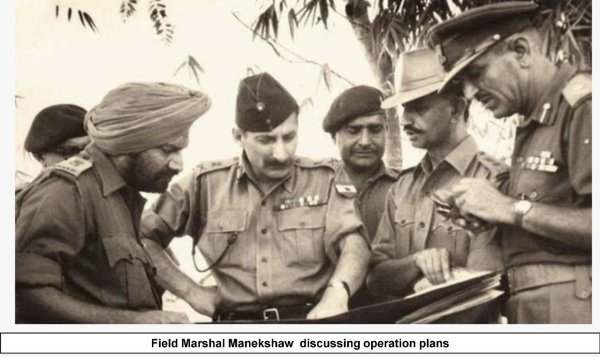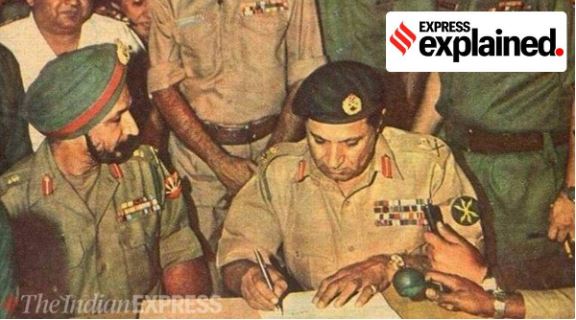Vijay Diwas: A recap of the 1971 Indo-Pak War, which helped birth Bangladesh
The Indo-Pak War of 1971, which was short and intense, was fought on both the Eastern and Western fronts over 13 days. A look at what led to it, and how India played its part in the liberation of Bangladesh.
Vijay Diwas or Victory Day is commemorated on December 16, marking the end of the 1971 Indo-Pak War and the liberation of Bangladesh. India declared victory on this day 51 years ago after Pakistan signed the Instrument of Surrender.
So, what led to the war, which was found over 13 days? We explain the history.
Vijay Diwas: What led to the 1971 Indo-Pak War?
After the partition of India following the end of British rule in 1947, two independent countries were formed – India and Pakistan. The latter consisted of East Pakistan (now Bangladesh) and West Pakistan (present-day Pakistan). The two Pakistans had their share of problems since the beginning because of a number of reasons – the most glaring one being the geographical disconnect between them.
East Pakistan was often overlooked in terms of administration as the top posts were held by those in the West. There was also an issue of cultural conflict. For instance, when Urdu, used in West Pakistan, was made the official language of the country, it was seen as an imposition on the culture of the people in the East.
In the mid-1960s, leaders such as Sheikh Mujibur Rahman, who is also known as the founder of Bangladesh (and the father of current Prime Minister Sheikh Hasina), actively began protesting against these policies and helped form the Awami League. Soon, their demand became one for freedom and greater autonomy. The League ended up winning a stunning 160 of the 162 seats in East Pakistan in the 1970 elections – and won no seats in the West.
Zulfikar Ali Bhutto’s Pakistan People’s Party won 81 of the 138 seats in West Pakistan, but Mujib had a clear overall majority in the House to become the Prime Minister. However, instead of recognising the mandate, on March 25, 1971, the Pakistani military began a brutal crackdown that saw the mass slaughter of Bengalis.
March 26 is now marked as Bangladesh’s independence day.
As Bangladeshi poet Daud Haider wrote in The Indian Express, “At midnight on March 25, Pakistan unleashed genocide in Bangladesh. Refugees streamed into India. India stood by Bangladesh in its freedom struggle and one must salute the contribution of Indira Gandhi — as well as of the Indian Army — in winning liberation for Bangladesh… The Pakistani supremacy lasted two and a half decades — religion and the two-nation theory fell on the way.”
India’s role in the 1971 War
India had declared support for the League previously. Without direct intervention, this was visible: on May 15, it launched Operation Jackpot, an operation to recruit, train, arm, equip, supply and advise Mukti Bahini fighters engaged in guerrilla warfare against the Pakistan military.
There was a diplomatic plan in place, too. Former diplomat Chandrashekhar Dasgupta, who was posted in Bangladesh in 1972, wrote in his book India and the Bangladesh Liberation War: The Definitive Story, “the first task of the foreign ministry was to promote international sympathy and support for Bangladesh… Of course, the Bangladeshis were doing this very effectively themselves, but we assisted them in a major way.”
 Field Marshal Sam Manekshaw discussing operation plans. (Twitter/@rajnathsingh)The second task was to “explain to the international community that the problem in East Bengal was not simply an internal problem of Pakistan — that by driving out millions of refugees into India, Pakistan was exporting a domestic problem to India. And, this threatened to destabilise the political situation in the neighbouring states.”
Field Marshal Sam Manekshaw discussing operation plans. (Twitter/@rajnathsingh)The second task was to “explain to the international community that the problem in East Bengal was not simply an internal problem of Pakistan — that by driving out millions of refugees into India, Pakistan was exporting a domestic problem to India. And, this threatened to destabilise the political situation in the neighbouring states.”
“If India intervened without clearly justifying the action in foreign eyes, the charge that it was engineering the break-up of Pakistan would be established and Bangladesh would be refused recognition by the majority of nations,” Dasgupta said.
But when the Pakistan Air Force launched pre-emptive strikes towards Western India (including Amritsar, Pathankot, Srinagar, Avantipura, Ambala, Sirsa and Agra) on December 3, 1971, India formally declared war on December 4.
Then prime minister Indira Gandhi said in a radio address, “We have no other option but to put our country on a war footing. Our brave officers and jawans are at their posts, mobilised for the defence of the country. Emergency has been declared for the whole of India. Every necessary step is being taken, and we are prepared for any eventualities.”
A decisive victory
The war, which was short and intense, was fought on both the Eastern and Western fronts over 13 days. “The notable battles which were fought in the area of responsibility of the Southern Army included the famous battles of Longewala and Parbat Ali where Pakistan’s armoured forces were destroyed by resolute Indian troops. The raid on the Pakistani town of Chachro carried out by soldiers of the renowned 10 Para Commando Battalion led by Lieutenant Colonel (Later Brigadier) Bhawani Singh, the erstwhile ruler of Jodhpur state was another famous military action,” a government release stated.
An important figure in this war was India’s Field Marshal Sam Manekshaw (pictured above), who is often evoked in relation to it. His planning and strategy helped secure one of the quickest victories in recent military history.
This Day, That Year! pic.twitter.com/t9Tp73wvl2
— Rajnath Singh (मोदी का परिवार) (@rajnathsingh) December 16, 2021
On December 6, India formally recognised Bangladesh as an independent nation. Two days later, the Indian Navy launched an attack on Karachi. From December 12 to 16, Indian forces pushed through to Dhaka and entered the city, ending the war with a total victory.
Pakistan Eastern Command Commander Lt Gen AAK Niazi signed the instrument of surrender and capitulates to Indian Eastern Commander Lt Gen Jagjit Singh Aurora.


